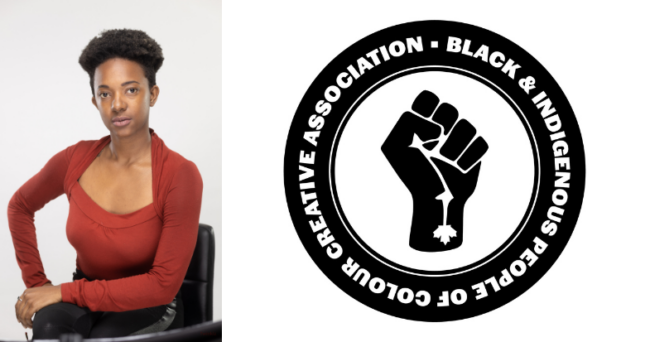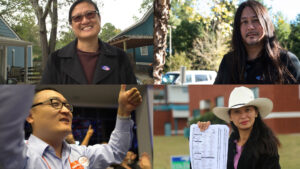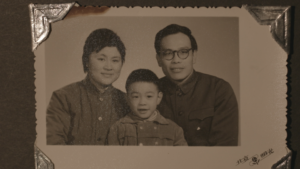Q&A with Chitinthi Tembo: Advocate for Diversity and Inclusion
- Feb 5, 2024
- /
- 2024 Events, Blog, Social Justice

By Anson Tso
Anticipating our forthcoming event, The Revolution Will Not Be Televised on February 6th, we had the honour of interviewing Chitinthi Tembo, Film Director and Co-Founder of BIPOC-CA who will also be a moderator, alongside Racial Justice Curator Natasha Tony.
Rooted in an unwavering aspiration to witness people who mirror her lived experiences flourish in their professional endeavors, Chitinthi shares her compelling story – a testament to resilience and defiance in the face of systemic obstacles.
What drives and inspires you in your professional pursuits and advocacy work?
Creativity, curiosity and ambition are definitely the pillars of what inspires my professional pursuits. I have always been rooted in my appetite for seeing people who look like me to strive and thrive professionally. I’ve always dreamt of being a creative, specifically within the film industry, as a crew member, as a Director.
I did my best to strategically position myself to get through the doors; however, I was unsuccessful.
I figured, “Hey, you have a degree from UBC in Human Geography and Critical Studies in Sexuality – whatever work you end up doing will make an impact.” I was rudely mistaken; I became a Technical Recruiter for IT and engineering jobs, after briefly working in B2B internet sales.
I longed to influence the technical industry by empowering underrepresented talent to secure jobs to diversify the industry. I was continuously met with resistance when I’d present candidates to different Account Managers. They told me our clients would deem them “bad culture fits,” the colloquial euphemism for “unwanted underdogs.”
I eventually faced my own fate in the industry through a wrongful dismissal from the company, largely due to my efforts to defy the status quo. On the contrary, they fabricated the reason for letting me go as “not meeting the numbers” (even though I was excelling at my targets at the time).
This was a blessing in disguise because the rise of the BLM movement happened shortly thereafter. Post George Floyd’s passing, our social fabric underwent transformation and it was now time for me to give the film industry another try. At that time, the industry was forced to acknowledge its hand in its blatant exclusionary practices and activate itself to change those conditions. Et voila – I work in production now.
It’s quite simple. Honestly, everyone wants to be seen in some way, shape or form, and I advocate for that through my work with creatives. Recognition and representation matter and I passionately advocate for that.
Can you share the story behind the inception of BIPOC-CA? How did the idea come about and what inspired its creation?
Our movement began in protest on July 1, 2020. During the uprisings, myself and my co-founders were deeply affected by the injustice of celebrating “Canada Day,” a day which sensationalizes and glorifies genocide and colonialism, and especially excludes the recognition of the Indigenous and Black peoples who built this country. We wanted to pay homage to our ancestors, as well as the unity we once shared before the divisive tactics of systematic separation.
We hosted a creative protest called Culture Day, showcasing talent from up to 30 Black and Indigenous artists. This took place to demonstrate that we are here, we matter, and so do our cultural talents/influence.
Following Culture Day, the community requested that we become an organization to help represent our people, amplify our voices and increase our visibility within the arts and culture industry of BC.
The first iteration of The Revolution Will Not Be Televised event was hosted by BIPOC-CA. How did it all come about and what are your hopes for the upcoming one?
I had my directorial debut last year for a short documentary titled IronSelf. We had a screening at the Seattle Black Film Festival, which is where I met Elmer Dixon and Rick DuPree. The festival was celebrating the 55th anniversary of the former Seattle Black Panther Party and pre-screened a preview of their upcoming documentary.
BIPOC-CA has mirrored its mandates around teachings from the Panthers, so it was an honour to connect with them in person.
My Producer and I invited Elmer to do a book release/signing here in Vancouver and he happily accepted.
The goal of the first one was to spread awareness about the truth of who the Black Panthers were and their work. BIPOC-CA also fundraised for Rick’s documentary’s post-production. They weren’t sure if the release was going to happen on its anticipated date. All the ticket sales went towards the film.
Shortly after, the team was awarded one of the larger grants they were waiting for. As a result, they were able to start post-production on time!
The same applies to this event: my hope is to continue to educate and inspire folks to live as revolutionaries. Our current social condition demands it, so it’s important for the community to hear from one of them directly.
What does the phrase “The revolution will not be televised” mean to you personally, and how does it resonate with the themes of the event?
The phrase represents our lived experience to me. Society is continuously misguided and misinformed about my people and the revolutionary work we have done and continue to do to fight for justice. We have traversed beyond the bounds created to dehumanize us, historically. There are more often than not, demoralizing portrayals around our identities, which have constructed the damaging stigmas we fight against at present.
The documentary is an opportunity to hear the revolutionary story of the Seattle Panthers told authentically, through their voices. Told by us, for us. That’s the theme which resonates most for me with this event.
What do you hope attendees take away from the event?
I hope the attendees walk away knowing that they have the power to affect change. They have a voice and responsibility to activate that change. It does not fall on our shoulders alone; it is “all power to the people,” not just for some and not others! I hope they can spread awareness and feel inspired to act.
—-
On February 6th, join us for a memorable evening with Elmer Dixon, Author of Die Standing: From Black Panther Revolutionary to Global Diversity Consultant, and Rick DuPree, Director of Seattle Black Panthers Fight for Justice & Freedom.
Deep dive into history, books, and film with Natasha Tony and Chitinthi Tembo as your moderators.
Event details: https://reelcauses.org/revolution-will-not-be-televised/

About Reel Causes Society
Reel Causes partners with filmmakers and Canadian causes dedicated to addressing global social justice issues. We host film screenings followed by a Q&A session to educate and inspire our community, and provide a forum for authentic conversation aroundF the issues that affect us locally.









